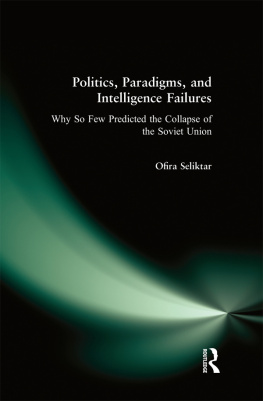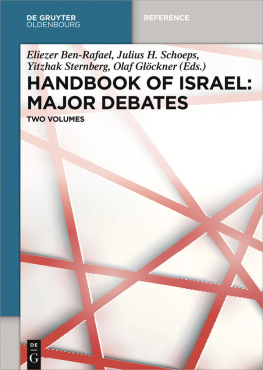ROUTLEDGE LIBRARY EDITIONS: ISRAEL AND PALESTINE
Volume 7
NEW ZIONISM AND THE FOREIGN POLICYSYSTEM OF ISRAEL
New Zionism and the Foreign Policy system of Israel
Ofira Seliktar
First published in 1986
This edition first published in 2015
by Routledge
2 Park Square, Milton Park, Abingdon, Oxon, OX14 4RN
and by Routledge
711 Third Avenue, New York, NY 10017
Routledge is an imprint of the Taylor & Francis Group, an informa business
1986 Ofira Seliktar
All rights reserved. No part of this book may be reprinted or reproduced or utilised in any form or by any electronic, mechanical, or other means, now known or hereafter invented, including photocopying and recording, or in any information storage or retrieval system, without permission in writing from the publishers.
Trademark notice : Product or corporate names may be trademarks or registered trademarks, and are used only for identification and explanation without intent to infringe.
British Library Cataloguing in Publication Data
A catalogue record for this book is available from the British Library
ISBN: 978-1-138-89267-5 (Set)
eISBN: 978-1-315-69513-6 (Set)
ISBN: 978-1-138-90514-6 (Volume 7)
eISBN: 978-1-315-69540-2 (Volume 7)
Publisher's Note
The publisher has gone to great lengths to ensure the quality of this reprint but points out that some imperfections in the original copies may be apparent.
Disclaimer
The publisher has made every effort to trace copyright holders and would welcome correspondence from those they have been unable to trace.
New Zionism and the foreign Policy System of Israel
Qfira Seliktar
1986 Ofira Seliktar
Croom Helm Ltd, Provident House, Burrell Row,
Beckenham, Kent BR3 IAT
Croom Helm Australia Pty Ltd, Suite 4, 6th Floor,
64-76 Kippax Street, Surry Hills, NSW 2010, Australia
British Library Cataloguing in Publication Data
Seliktar, Ofira
New Zionism and the foreign policy system of Israel.
1. Zionism 2. Israel-Foreign relations
I. Title
327.5694 DS119.6
ISBN 0-7099-3341-X
This book is Number 4 of MERI Special Studies series. Other books in this series may be obtained from:
Middle East Research Institute
University of Pennsylvania
3808 Walnut Street
Philadelphia, PA 19104
Written under the auspices of the Middle East Research Institute, University of Pennsylvania
Printed and bound in Great Britain
To my family which perished in the Holocaust and to my sons, Yaron and Dror, who provide the continuity.
Contents
Traditional studies of foreign policy, which was often equated with foreign relations and diplomatic history, have long outlived the 'classical' international system. The more rigorous methodology of the late 1960s generated the systems approach to international behaviour. A great deal of this endeavour concentrated on the macro-analysis of the global system which emphasised the politi cal, social and economic factors of the international environment.
The psychological properties of foreign policy were a minor offshoot in this development. Psychology was most frequently applied to the study of leadership, producing some notable con tributions such as the research on the operational code of elites. However, foreign policy issues have increasingly become a part of the domestic system in many countries. Massive popular participation has been dramatised by the rise of revolutionary groups, fundamentalist religious movements and new forms of international guerrilla warfare and terrorism.
To understand the psychology behind these new forms of inter national behaviour, we have to go beyond the study of the 'psychological prism' of the elite. Some current developments demonstrate that studying the attitudes of the ruling elites can sometimes limit our understanding of the changes in the popular belief system and their effect on foreign policy. The fundamentalist revolution in Iran is a good case in point. Excessive emphasis on the 'psychological prism' of the Westernised elite of the Shah has obscured our vision of the extent and depth of the change in popular beliefs. The psychological dynamics of this change which, once set in motion, produced an extremely rapid transition from a semi-westernised monarchy into an authentic fundamentalist republic, have left many academic and political analysts overtaken by events.
This book is the outcome of my intellectual quest for a research framework which could explain and predict such events. The choice of the concept of a belief system is based on the assumption that it can integrate individual and elite attitudes into a useful analysis of the psychology of a foreign policy system. This concept is discussed in the introductory chapter, which is methodological: however, the lay reader can understand the book without dwelling on the research design.
Israel is ideally suited for an analysis of a changing belief system and its impact on foreign policy. After some thirty years of dominance by the Socialist Zionist movement, Jewish society evolved a new belief system, New Zionism, which brought Likud into power in 1977. In line with its belief system, the Likud leadership proceeded to restructure the modus operandi of Israel's foreign policy system which subsequently resulted in the 1982 war in Lebanon.
The major task of this book is to recreate the long and extremely complex process of change in the belief system. To this end, I have reviewed and analysed most of the empirical studies which are relevant to the subject. My detailed scrutiny of the empirical data is especially important in understanding how the Socialist Zionist system was delegitimised and transvalued into New Zionism. I also hope that this large compilation of empirical evidence will con tribute to a better understanding of the psychology of the Arab Israeli conflict. While the Middle East struggle has attracted enormous attention, there is a relative paucity of empirical work as opposed to the preponderance of traditional foreign relations studies and polemical accounts.
In this book I use the term New Zionism to define the belief system which replaced Socialist Zionism. The term does not imply that New Zionism is a new ideology. The name was first used in the early decades of this century by the Revisionists, whose ideology forms the core of the new belief system. I have decided to employ the original term without apologetic quotation marks, which may imply that the belief system is somehow not authentic.
The term 'Greater Land of Israel' used in the book is an inaccur ate translation of the Hebrew term Eretz Israel Hashlemah which means 'the Whole of the Land of Israel'. I decided to use the former term because of its widespread currency in English language publications.
Throughout the book I use the term 'Israelis' as synonymous with 'Jews'. This form is a literary convenience rather than a political statement. The book makes it clear that 15 per cent of Israel's population, or one in six Israelis, is an Arab and a citizen of the State of Israel.













